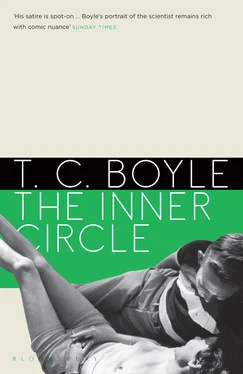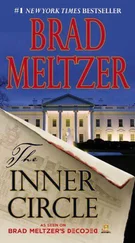T. Boyle - The Inner Circle
Здесь есть возможность читать онлайн «T. Boyle - The Inner Circle» весь текст электронной книги совершенно бесплатно (целиком полную версию без сокращений). В некоторых случаях можно слушать аудио, скачать через торрент в формате fb2 и присутствует краткое содержание. Год выпуска: 2006, Издательство: Bloomsbury UK, Жанр: Современная проза, на английском языке. Описание произведения, (предисловие) а так же отзывы посетителей доступны на портале библиотеки ЛибКат.
- Название:The Inner Circle
- Автор:
- Издательство:Bloomsbury UK
- Жанр:
- Год:2006
- ISBN:нет данных
- Рейтинг книги:4 / 5. Голосов: 1
-
Избранное:Добавить в избранное
- Отзывы:
-
Ваша оценка:
- 80
- 1
- 2
- 3
- 4
- 5
The Inner Circle: краткое содержание, описание и аннотация
Предлагаем к чтению аннотацию, описание, краткое содержание или предисловие (зависит от того, что написал сам автор книги «The Inner Circle»). Если вы не нашли необходимую информацию о книге — напишите в комментариях, мы постараемся отыскать её.
The Inner Circle — читать онлайн бесплатно полную книгу (весь текст) целиком
Ниже представлен текст книги, разбитый по страницам. Система сохранения места последней прочитанной страницы, позволяет с удобством читать онлайн бесплатно книгу «The Inner Circle», без необходимости каждый раз заново искать на чём Вы остановились. Поставьте закладку, и сможете в любой момент перейти на страницу, на которой закончили чтение.
Интервал:
Закладка:
I accepted one of the little glasses — about a thimbleful — while Prok expatiated on the properties of the various liqueurs on the tray, remarking how a colleague traveling in Italy had brought him back this one and how that one had come highly recommended by Professor Simmonds of the History Department, and I really didn’t have to say much in response. I sipped at the drink — it smelled powerfully of some herb I couldn’t quite place and had the consistency and cloying sweetness of molasses — all the while realizing that my initial surmise was correct: Professor Kinsey didn’t know the first thing about drinking. We were talking about the marriage course — my impressions of it — when Mac slipped back into the room with another tray, this one featuring my Stilton in the center of an array of saltine crackers.
“Just dissecting the marriage course,” he said, giving her a look I couldn’t fathom, and it occurred to me then that he must have taken her sex history as well — she must have been among the first — and the thought of that, of the husband quizzing the wife, gave me a strange rush of feeling. He was a master of the interview, as I knew from experience and would have reemphasized for me again and again as the years went by, and there was no dodging him — he could tell in an instant if the subject was hedging, almost as if he were hooked up to him like a human lie detector. She would have had to tell him everything, and he would know her secrets, as he knew mine. I saw, with a sudden thrill, the power of that knowledge. To give up your history was to give up your soul, and to possess it was the ultimate aggrandizement, like the cannibal growing ever greater with the subsumed spirit of each of his successive victims.
At dinner, the conversation was exclusively of sex. Prok went on about his project, how he could develop a taxonomy of human sexual behavior in the way he was able to classify wasps according to variations within the species. We were eating a stew of some sort — goulash, Prok called it — which he’d prepared himself. He served milk rather than beer or wine, pouring it out of a glass pitcher and making one of his rare stabs at wit (“Care for some milk, Milk? ”), and there were just the three of us at table. The children had apparently been fed earlier, so that, as Prok put it, “We can get to know one another without having to divide our attention,” and every time Prok drew a breath, which was rarely, Mac put in her two cents on the subject. And that surprised me, because she was every bit as informed as he — and every bit as capable of dropping terms like “cunnilingus” and “fellatio” into the dinner conversation.
For my part, I luxuriated in the attention. I’d never thought of myself as anything other than ordinary, even when I made A’s in my course work or managed to score a touchdown on a broken play in a high school football game, and here were two vibrant, intelligent, worldly people — two adults — soliciting my opinions and treating me as an equal. It was heady, and I felt I never wanted to leave that table or that sofa by the fireplace where we settled in after dinner with bowls of vanilla ice cream while Prok lectured in his high tireless voice and Mac knitted with perfect articulation. Nine o’clock came and went, and then ten. Mac disappeared at one point to be sure the children were in bed (two girls of fourteen and sixteen, and a boy of eleven), and there was an awkward moment during which I expressed my concern over the lateness of the hour, but Prok dismissed me with a wave. Far from being exhausted, he shifted into a higher gear.
He poked at the fire, then eased himself down on the floor with the cloth braids he was fashioning into a new rug (“Very economical, Milk — you should take it up. Any discards, old clothes, sheets and the like, plus strips of muslin dyed in whatever color you prefer, and you’d be surprised how durable such a rug can be. Why this one, the one beneath me here? I wove this as an assistant professor in our quaint little rental back in 1921, our first home, in fact, after we were married”) and in the quiet broken only by the snap and hiss of the fire, he opened up to me all his hopes and aspirations for the project. Ten thousand interviews, that was what he wanted — at a minimum — and the interviews had to be conducted face-to-face to assure accuracy, unlike the printed questionnaires or subjective analyses previous researchers had favored. Only then could we (he was already including the young neophyte before him) have the data to drive down the hidebound superstitions that had ruined so many lives. Take masturbation, for instance. Did I know that reputable people — doctors, ministers and the like — had actually promoted the egregious notion that masturbation leads to insanity?
He turned to me, his spectacles giving back twin images of the fire eating at a split oak log so that the reflection dissolved into his eyes. “Why, masturbation is the most natural and harmless outlet the species has acquired for release of sexual tension. It is purely positive, a veritable benefit to the species and to the society at large, and any minister worth his salt should be delivering sermons on that subject, believe me. Just think, Milk, just think of all the harm done by sexual repression and the guilt normal healthy adolescents are meant needlessly to feel—” I must have colored at this point, thinking of our last interview, because he changed tack suddenly and asked me point-blank if I wouldn’t help him by contributing to the project.
“Well, yes, I mean — certainly, I would be—” I fumbled, trying to recover myself. “But what could I do, in any material way, that is—?”
“Very simple,” he said, shifting his legs on the rug. “Just poll the men in your rooming house — you say there are fourteen of them in addition to yourself?”
“That’s right,” I said. “Yes. Fourteen.”
“Just poll them and convince them to come on into my office to give up their histories — you’ve got a potential one-hundred-percent group, there, John, do you realize that?”
I wasn’t the sort who fraternized easily — I think I’ve made that much clear here — and the prospect was daunting, but I found myself nodding my head in assent, because, as I say, you just didn’t say no to Prok.
And yet, even as I sat there conspiring with him like a favored son, somewhere in the back of my mind, obscured for the moment, was a dull but persistent sense of guilt over Iris. You see, it wasn’t simply my indecision over the cheese that had made me late that evening, but the fact that I’d left Iris — or the Iris situation, I should say — to the last minute. I don’t know why that was — I’m not a procrastinator, or not normally, else I wouldn’t have accomplished what I had at school or would come to achieve in later years with Prok — but every time I thought of phoning Iris my heart began to pound so violently I was afraid I was having a seizure, until finally I realized I had to see her in person, if only to explain myself and try to patch things as best I could. I did want to go out with her, very much so — I’d begun to think about her at odd moments, picturing her the way she was that day in the library or that afternoon at my mother’s, swinging her legs beneath the chair like a little girl, gesticulating to make a point, her eyes boiling up like cataracts over any issue at all, over parasites or poetry or the plight of the Lithuanians — but the longer I put off breaking our date the worse it was.
Finally it was Saturday, and I still hadn’t mounted the courage to see her. I woke to a burst of Paul’s blunt, ratcheting snores and a gray scrim of ice on the window, thinking Iris, thinking I had to go to her dorm right that minute and ask her to breakfast so I could look into her eyes over fried eggs and muffins and coffee and tell her I’d take her out the following Saturday, without fail, that I was looking forward to it, that there was nothing I’d rather do (and maybe, since I’d already bought the tickets for tonight she might want to go with a friend?), but that she had to understand, and I was sorry, more than sorry — distraught — and could she ever forgive me? But I didn’t go to her dorm. It was too early. Seven. It was only seven, or just past, and she wouldn’t be up for hours, or so I told myself. Instead, I took my books to breakfast alone at the Commons and read the first six stanzas of Milton’s “Il Penseroso” over and over till I couldn’t take it anymore (“Hence vain deluding Joys,/The brood of Folly without father bred,” et cetera), pushed myself up from the table and slammed out the door before I knew what I was doing.
Читать дальшеИнтервал:
Закладка:
Похожие книги на «The Inner Circle»
Представляем Вашему вниманию похожие книги на «The Inner Circle» списком для выбора. Мы отобрали схожую по названию и смыслу литературу в надежде предоставить читателям больше вариантов отыскать новые, интересные, ещё непрочитанные произведения.
Обсуждение, отзывы о книге «The Inner Circle» и просто собственные мнения читателей. Оставьте ваши комментарии, напишите, что Вы думаете о произведении, его смысле или главных героях. Укажите что конкретно понравилось, а что нет, и почему Вы так считаете.












